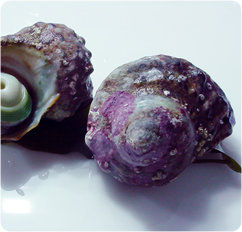|
Family Turbinidae - Turbo & Astraea Snails
Husbandry Tips for Some of the Best Algae-Grazing Snails for Your Clean-Up Crew
 |
| Turbo Snails (Turbo fluctuosa ) |
Amongst the gastropods (Class Gastropoda or snails), most marine aquarists have at least heard of the turbo snails from the Family Turbinidae. Turbo snails, along with their relatives, the Astraea snails, are fantastic grazers and can be long-lived aquarium animals if provided with the proper husbandry.
Algae-grazing snails from the Family Turbinidae are frequently employed for janitorial duties in marine aquaria. In fact, in the United States it is the rare saltwater aquarium that does not have at least one species from this family. These snails are commonly sold as turban snails, turbo snails and star snails. Like trochus snails, turbo snails have a conical shell which, in the case of some of the larger Turbo spp., can grow to half a foot in size. Turbo snails can be differentiated from trochus snails by looking at their undersides. You will see a large opening (called the aperture) with a white operculum (the piece which closes off the aperture when the snails body is retracted) on a turbo snail. Trochus snails have a brown operculum.
While these snails are common in the marine aquarium hobby, too many aquarists give too little thought to their husbandry requirements. Snails in general are complex animals that can be badly injured or killed by sudden changes in water parameters. Unless the salinity of the holding water and the destination aquarium are very, very close, all snails should be given plenty of time to acclimate using a drip acclimatization procedure.
One of the leading causes of premature death for turbo and astraea snails is the fact that sub-tropical and temperate species are added to tropical aquaria. While snails, especially ones from shallow water environs and intertidal zones, are very tolerant when it comes to thermal conditions, longterm exposure in a tropical system will greatly shorten the lifespan of a temperate snail. When it comes to snails that are both temperate and tropical, be sure your retailer is only selling you animals collected from tropical (and, in some cases, sub-tropical) regions. This can make the difference between your turbo or astraea snail living a matter of months or a matter of years (even decades in some cases).
One potential downside to both turbo and astraea snails is the fact that the environmental conditions in the aquarium often do not match these animals natural habitat. Astraea snails, for example, are collected from rubble zones and reef flats where they seldom have occasion to fall from a height and land upside down. If they do happen to land upside down, the chaotic nature of the currents and wave action in these regions generally rights the snail before its vulnerable underside is threatened. In the aquarium, however, it is not unusual to see an Astraea snail upside down in the sand and unable to right itself. If left unattended, the snail will most likely die.
In general, however, tropical snails from the Family Turbinidae make good animals for the tropical saltwater reef aquarium. They are excellent grazers, and those that are collected from the tropics and appropriately cared for will provide years of service, not to mention fascinating behavior for the observant aquarist.
Published 29 July 2008. Blue Zoo Aquatics
|